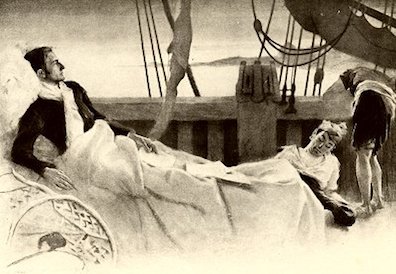Looking at the naked woman depicted in a scene from Ruby, Bloom notes that
the illustrator has preserved some decorum: "Sheet kindly
lent." (And indeed this phrase was in the novel.) He may also
be irreverently echoing the opening words of a popular hymn, "Lead,
Kindly Light," the words for which were written by John Henry
Newman (later Cardinal Newman) in 1833 as a poem titled The
Pillar of Cloud. Bloom has a history with this song: in
Penelope Molly recalls a time when he got her a gig
singing Rossini's Stabat
Mater in a church by telling the Jesuit organizers
that he was setting Newman's words to music.
Newman wrote the poem as a young priest when his ship was
becalmed for a week between Corsica and Sardinia, after weeks
of illness in which he was desperate to leave Italy and return
to England. The first stanza expresses his state of physical
longing and spiritual faith, with one step completed and many
more to go:
Lead, Kindly Light, amidst th'encircling gloom,
Lead Thou me on!
The night is dark, and I am far from home,
Lead Thou me on!
Keep Thou my feet; I do not ask to see
The distant scene; one step enough for me.
Set to several different tunes, the hymn has enjoyed great
popularity. In the 20th century it was sung by trapped
survivors of a mine explosion, by occupants of one of the Titanic's
lifeboats, by troops going into the trenches in WWI, and by
women being led to a concentration camp by S.S. troops.
Zack Bowen (Musical Allusions, 88) infers an
allusion because of the verbal similarities between "Lead
kindly light" and "Sheet kindly lent," and they are striking:
assonance and near-alliteration (amounting to near-rhyme) in
the first word, an identical second word, and identical
alliteration at the beginning and the end of the third word.
It is certain that Bloom knows the hymn, because Molly
remembers how "he got me on to sing in the Stabat
Mater by going around saying he was
putting Lead Kindly Light to music I put him up to that
till the jesuits found out he was a freemason thumping
the piano lead Thou me on copied from some old
opera." As a Catholic cardinal and a famous Catholic convert,
Newman's authorship of the hymn would certainly have
recommended it to Jesuits organizing a performance of sacred
music.
What to make of Bloom's flippant reference to this
inspirational religious song, in the context of a naked woman
being beaten with a whip, is harder to imagine. He may simply
be playing whimsically with the sounds of the words. But the
effect is certainly at least a bit "witty"—a faculty he
wonders whether he possesses.
